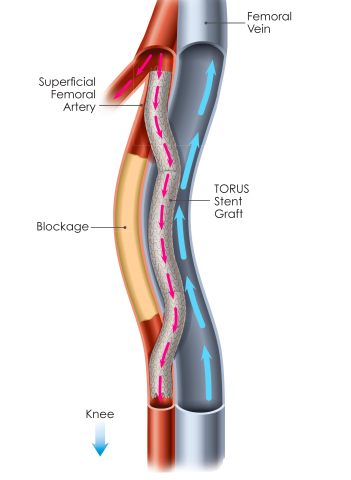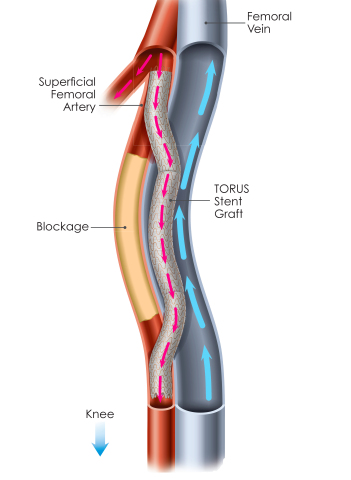SUNNYVALE, Calif.--(BUSINESS WIRE)--PQ Bypass, Inc., today announced it has received conditional approval of its investigational device exemption (IDE) from the U.S. Food and Drug Administration (FDA) to initiate the pivotal DETOUR II clinical trial. As the first-ever pivotal trial for percutaneous femoropopliteal bypass, DETOUR II will evaluate the safety and effectiveness of the DETOUR System in up to 292 patients with lower limb ischemia due to long blockages (>15 cm) in the superficial femoral artery (SFA) caused by peripheral artery disease (PAD).
“Patients with life-limiting claudication or critical limb ischemia typically have lesions longer than 15 cm, and we know that lesion length is directly proportional to patency. Until now, endovascular methods of treating these long lesions have not been comparable to open bypass surgery,” said Sean P. Lyden, M.D., professor and chairman of the department of vascular surgery, Sydell and Arnold Miller Family Heart & Vascular Institute at Cleveland Clinic, and national co-principal investigator of DETOUR II. “The DETOUR procedure is designed to treat patients with severely calcified or long-segment disease. It’s essentially a femoropopliteal bypass with polytetrafluoroethylene, but done percutaneously. The DETOUR I trial in Europe demonstrated safety and efficacy in patients with lesions as long as 44 centimeters in length, and we look forward to continuing to study this procedure with the commencement of DETOUR II.”
DETOUR II is a prospective, single-arm, global multi-center trial and will be conducted at up to 40 sites to enable the collection of safety and effectiveness data in support of a pre-market approval (PMA) submission to the FDA. Additionally, to demonstrate health economic outcomes, the trial includes a prospective economic study designed to collect data related to the costs associated with treating PAD in the study population. An economics core lab will lead the collection of quality-of-life outcome measures (collected at baseline, 30 days, six and 12 months), and procedural and follow-up costs, including rehospitalizations, through 24 months.
“We worked closely with the FDA, leading physicians and healthcare administrators to design a trial that we expect to demonstrate the total value of this unique approach to treating severe PAD,” said Richard Ferrari, chairman of the board of directors at PQ Bypass. “DETOUR II is an exciting milestone in the journey toward establishing a potentially transformative future standard of care for these patients.”
Percutaneous femoropopliteal bypass (the DETOUR procedure) is an entirely new procedure enabled by PQ Bypass’ proprietary DETOUR System, which is comprised of the TORUS Stent Graft, DETOUR Crossing Device, and DETOUR Snare. The DETOUR procedure creates a pathway that originates in the SFA, travels through the femoral vein and ends in the popliteal artery, bypassing the diseased part of the artery. This pathway allows TORUS Stent Grafts to be placed in a continuous line and consistently re-direct oxygen-rich blood around the blockage, restoring blood flow to the lower leg and foot of the patient. Unlike existing technologies such as stents and drug-coated balloons, which merely create a channel through the disease and are not designed for extremely long blockages, the DETOUR procedure is a unique solution designed to provide the durability of open bypass surgery but with a minimally invasive approach.
“The DETOUR System features a truly innovative, intuitive design and the trial will investigate its benefits in addressing long lesions that are not well served by existing minimally-invasive approaches,” said Jihad A. Mustapha, M.D., clinical associate professor of medicine, Michigan State University College of Osteopathic Medicine and national co-principal investigator of the DETOUR II Trial. “We look forward to working with the DETOUR II Trial clinical sites on this important research.”
About PQ Bypass
PQ Bypass, Inc. is a Silicon Valley-based medical device company working to transform the treatment of long segment peripheral artery disease with minimally invasive endovascular solutions.
PQ Bypass is operated by recognized leaders in the medical device industry including veterans from Medtronic, Abbott, Johnson & Johnson and Stryker. The underlying technology and technique used in the percutaneous DETOUR procedure were co-developed by two world-renowned cardiologists and innovators, Dr. James Joye and Dr. Richard Heuser, who are recognized experts in peripheral artery disease.
In March 2017, PQ Bypass received CE (Conformité Européenne) Mark approval for all three devices that are included in the DETOUR System.
In August 2017, Frost & Sullivan recognized PQ Bypass with the 2017 European PAD Interventions Technology Innovation Award for the DETOUR System.
The DETOUR System is not available for sale in the U.S. For more information, please visit www.pqbypass.com




